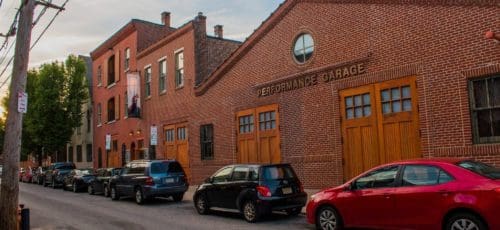Headlong’s DESIRE Arrives In May: A Quick Chat With Andrew Simonet
Headlong Dance Theater returns to the stage this May with a new show, DESIRE, directed by K. Elizabeth Stevens, and performed and co-conceived by Headlong co-directors Amy Smith, Andrew Simonet, and David Brick. The piece will be at the Performance Garage, 1515 Brandywine Street, one of my favorite places, May 4 and 5 at 8pm and May 6 at 3pm. A reception will follow the May 5 performance. We caught up with Andrew and had him give us the lowdown on DESIRE.
Live Arts: How did this project come about?
Andrew Simonet: We have been looking to get back on stage together. In the last decade, one of us has usually sat out to direct—or at least jumped in and out. There is an amazing clarity and connection we have when we are in the studio or on stage together. But when you run a company together your focus is on a lot of different things: the production, the design, the budget, the PR. Elizabeth, my wife, came to us and proposed directing us in a trio and it felt perfect. A chance to work together, create together, and share the stage—with someone else running the show!
LA: You, and your co-directors Amy Smith and David Brick are performing together. It seems like you’ve all been getting back on stage more lately. Why so, and what are you learning by doing so now?
AS: A lot of things can pull us away from performing. In 2008-2009, we did a project with Tere O’Connor, and none of us could be in the piece, so we spent two years working with our six dancers, and not performing. That process opened up a lot of possibilities in our work and our collaboration. We have new ways of developing and analyzing work. So being together as performers has a beautiful familiarity and a sense that there are new places for us to go together.
LA: How does the experience of performing differ now than from, say, 15 years ago?
AS: I can’t speak for everybody. But here’s what I would say: it’s clear. Like water. There is immediate recognition and understanding. You know where each person is going. You know how to say yes, and how and when to contradict.
 LA: Can you tell me about the director of the piece, what being the director means in such work, and how as DESIRE’s creators and performers, the 3 of you negotiate creative decisions with a director.
LA: Can you tell me about the director of the piece, what being the director means in such work, and how as DESIRE’s creators and performers, the 3 of you negotiate creative decisions with a director.
AS: Elizabeth is a theater director. She has some experience making original work, but mostly she directs scripts, often with a lovely, and dilated, visual and physical world. I just saw her show Ivona, Princess of Burgundia, at Swarthmore, and there was so much movement and gesture and rhythm in it.
For us, it’s always a great relief to be performer/creators rather than directors. We can propose lots of ideas, make lots of material, improvise, and we don’t have to steer the ship. I think Elizabeth depends on us for some guideposts of how to make a dance theater piece. But she also has strong ideas.
LA: The tagline for the show is “a group of lost souls try to make their community more so”—can you explain that concept?
AS: Our company, like our community, has had a strong utopian urge from the beginning. A bit of family, a bit of commune, a bit of wayward rock band. There’s this central question: what are meaningful ways to live in America? We’re all deeply spiritual but rather religion-phobic. Art, community, and the body gave us a home. In our twenties, it was all more frantic and fabulous and maybe a bit desperate.
LA: There’s an interesting relationship between being a lost soul yet also being part of a greater community, of connections and divisions—can you speak to that, and how movement and bodies may work in the same way?
AS: Part of being three is that there are constantly evolving two-versus-one arrangements, on stage and off. Who is close? Who’s on the outside? Who’s the duet and who’s the soloist?
So many performance pieces—dance, theater, performance art—propose a social world on stage. There is a set of social/spatial/kinesthetic relationships that mirror or distill or contradict our culture. So when you’re making performance, especially the stuff we like, you’re always asking questions like: what is closeness? What do these bodies need from each other, from the audience, or from the movement?
Community carries with it the great sorrows of being alive. Relationships begin and end. Lives change. Bodies change. And if you have utopian urges—as I certainly did and probably do—there is the constant sorrow of colliding with the world in all its incomplete, unstable, and contingent glory. That’s a sweet sorrow, more like the coming of winter than your house caving in. But still.
DESIRE, May 4 at 8pm, May 5 at 8pm (reception to follow), May 6 at 3pm, Performance Garage, 1515 Brandywine Street, Philadelphia, only $15! Get tickets at www.headlong.org.


